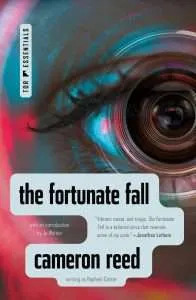REVIEW: The Fortunate Fall by Cameron Reed
The Fortunate Fall is an extraordinary cyberpunk debut from Cameron Reed, back in print from Tor Essentials after decades. First published in 1996, The Fortunate Fall a worthy entry into the cyberpunk canon, one that stands a real possibility of drawing new readers and enlivening the genre, which has been in real danger of calcifying into an aesthetic defanged of political critique, as Lincoln Michel has noted in his essay “The Future in the Flesh: Why Cyberpunk Can’t Forget the Body.”
 Hopefully this reissue will introduce The Fortunate Fall to a new generation of readers. Those lucky few who read and loved it the first time around, meanwhile, can re-encounter the novel through Jo Walton’s excellent introduction, which contextualizes The Fortunate Fall at the time of its publication while emphasizing the ways in which it remains ground-breaking today.
Hopefully this reissue will introduce The Fortunate Fall to a new generation of readers. Those lucky few who read and loved it the first time around, meanwhile, can re-encounter the novel through Jo Walton’s excellent introduction, which contextualizes The Fortunate Fall at the time of its publication while emphasizing the ways in which it remains ground-breaking today.
In a way, The Fortunate Fall is about the experience of re-reading, revisiting a narrative only to have it reinterpreted in a new light. Our narrator, Maya Andreyeva, is a “camera,” a reporter who broadcasts not only the news but memories and sensations to a live audience through assorted implants and networked interfaces. (I have to imagine that if Reed were writing today, she might have reached for a word like ‘streamer’ to describe Maya’s relationship to her audience.) With the help of a “screener,” a highly intimate kind of tech support—Maya’s screener, Keishi Mirabara, offers a beautiful complication of the cyberpunk genre’s smartmouth hacker archetype—Maya’s viewers not only see what she sees, they feel and think as she feels.
The Fortunate Fall takes the fascinating tack, therefore, of having Maya address an audience that already knows how the story ends. The novel opens, “The whale, the traitor; the note she left me and the run-in with the Post police; and how I felt about her and what she turned out to be—all this you know.” Decoupled from the immediacy of sensation, readers will know less of her story than they did, watching it the first time. By knowing less, they—and we, who know nothing at all—may understand more.
This immersive approach does have its drawbacks. The first hundred pages, in which Maya and Keishi attempt to report on a recent holocaust, nearly forgotten or purposefully covered up, can feel like an exercise in learning how to read The Fortunate Fall’s specific vocabulary of Net-rune and moistdisk, Weavers and Postcops. Cyberpunk in general can suffer from proper noun disease, and Reed’s novel is no exception.
Her prose, however, is stunning, and her characters compelling enough to make the effort worthwhile. Maya and Keishi’s forced intimacy—not physical, but psychic—slowly gives way to a tentative, prickly, genuine connection. By the middle third, the novel comes fully into its own, serving up a taut political thriller. But then Reed raises stakes once again. How The Fortunate Fall ends—the whale, the traitor, “how I felt about her and what she turned out to be—has been known from the beginning. But in the process of unravelling what each of those pieces mean, and how they fit together, The Fortunate Fall becomes a heart-breaking meditation on love, betrayal, and the cost of knowledge.
The fortunate fall of the title alludes to the Christian concept of felix culpa. This theodicy—a solution to the problem of evil—tries to find redemption in the fall of Adam. Without it, philosophers of the fortunate fall suggest, humanity could never have experienced the joy of redemption. In the end, The Fortunate Fall is similarly concerned with the moment of betrayal. Reed asks: what is love worth? Not, what would you do for love, but a question both harder to face and harder to answer. And so I think it’s appropriate that the novel ends on the moment of asking, a dangling question that some readers may find unsatisfying.
What does love excuse? What crimes, what trespasses? What actions, taken in the name of a greater good? Are love, and a righteous cause, enough to undo the shock of betrayal, the sting of hurt? Maya has her answers. Yours may differ, or maybe not.
The Fortunate Fall ends, not with an escape into the transhuman ether, but with a return to the body: a punch in the gut.
Read The Fortunate Fall by Cameron ReedThe post REVIEW: The Fortunate Fall by Cameron Reed appeared first on Grimdark Magazine.



